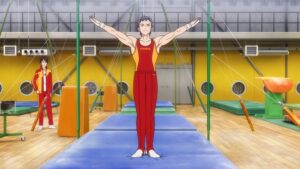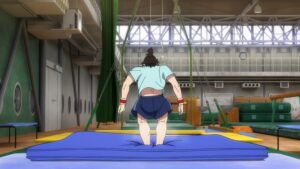This is the end of the road for my full Taiso Samurai writeups. Cobbling together this post was like trying to build a bird house with a hammer but no wood, and I’m not interested in repeating the experience. With just three episodes left, I’m very likely to finish the show, and there’s a decent chance it’ll be mentioned in our weekly recap columns, but its meandering story isn’t something I’m willing to spend too much brain space on next month. December already has a winter preview to write, a Best of 2020 post to plan, and a real life holiday season to prepare for (among other things). Meanwhile, Taiso Samurai’s narrative feels less diverse and more distracted the closer we get to the end. Accordingly, this will be a bit of a “Why I Dropped It” post, but my thoughts on both episodes can be found after the jump, too.
There was no “straw that broke the blogger’s back” moment for me in either of these installments – after all, I still like the show well enough to keep watching it. My issue is that its disparate elements aren’t being brought together, which becomes a bigger and bigger problem as its conclusion looms ever larger. If this show were a compass, its needle would never settle on north, or any other direction for that matter. Instead, it would flit between sports anime, slapstick comedy, and familial drama from episode to episode. That’s one of the series’ most interesting characteristics, but even someone who values that elusiveness can find it wearing on them after a while. One would assume that Taiso Samurai’s climax will be a gymnastics meet where Jotaro lands his new quadruple flip (the “Aragaki Mark II”), but what role would Leo or Rei have in that success apart from cheerleader? And if Jotaro and Leo’s performances are paralleled in the final episode, won’t they be shortchanged due to the lack of on-screen prep for both?
Just mentioning Leo is frustrating because there’s so little to comment on. We finally learned his true identity in these episodes, getting a glimpse of his profession and country of origin in episode 7, then picking up his real name (Leonardo Sturges) in the follow-up. He’s a ballet dancer, one of the best in the world, who’s been recovering from an illness in Japan for an extended period. Even though he’s healthy now, and even after the trio of Agent Smith wannabes bring him back to London, his coach gives him the okay to return to Japan for six more months, making all the mystery surrounding his character feel like time wasted. The only benefit of having his identity withheld for so long was postponing his first dance scene until episode 7, supplying an otherwise lightweight outing with a standout moment. Much less impressive was his routine at Jotaro’s gym the week afterward, which was so faithfully rotoscoped that it lacked any semblance of personal expression.
Between the two episodes in this post’s title, it’s “Intensive Samurai Training” that bears the brunt of my disappointment. It tries to split itself into two parts: one about an inspiring visit from Rei’s friend Kitty, and the other about Leo’s assistance in Jotaro’s quest to land a quadruple flip. There was no overlap between the two in terms of shared scenes, but both focused on pairs of characters, each with a member of the Aragaki family taking advice from a more instinctually driven friend. That’s a great story structure, but it breaks its ankles when attempting a dismount. Kitty’s advice leads directly to Rei’s discovery of a personal goal, which is wonderful; Leo’s advice is vague and nonsensical, but Jotaro makes a bunch of progress off camera anyway. It won’t come as a surprise to anyone reading this post that Rei is the show’s strongest character, which makes me wonder why Taiso Samurai wasn’t a family show from the beginning. Much of the father-daughter bonding the show has attempted has been weak, because it prefers to paint him as a resurging gymnast rather than a dad; meanwhile, Rei outshines him on a regular basis.
The Chinese training camp in episode 7 was the show’s chance to bring its focus back to athletics – not necessarily forever, but at least in a meaningful way. The big positive to emerge from the camp was Liu Longxiang, a world champion whose skill outstrips even Tetsuo’s in a head-to-head contest. His no-nonsense personality and disdain for Jotaro’s comeback attempt are leagues better than Tetsuo’s angry Sasuke routine, and they’re tempered by his past admiration of the older man. The rest of the camp was far less successful at setting the table for the series’ final banquet, packed as it was with commentary from irrelevant side characters and Jotaro’s humorous nostalgia for the training facility. Part of the blame for this failure stems from episode 5’s obsession with the announcers at the NHK Cup, who received way more attention than the competitors themselves – if those gymnasts had been given memorable characteristics back then, their dialogue in “Training Camp Samurai” wouldn’t have felt so flat.
This isn’t the end of my writing on Taiso Samurai, but it’s the last post of this type that it’ll get from me. My guess is that this is one of the few sites on the English-speaking internet covering it from week to week, so it’s a minor shame to relegate it to the weekly summary. I’d rather not endure that tooth-pulling feeling for three more opinion pieces, though, so a demotion makes the most sense. And hey, I’ve gone from admiring the show for its unpredictability to scorning it for scattershot storytelling practices, so this column even had a bit of an arc to it (that’s more than I can say for the series itself, unfortunately). Hope everybody had a good November, and we’ll see you next month.





I had a similar issue actually to the previous director/writer’s work on Zombieland Saga. Namely that it tries like Taiso to juggle multiple genres (idol anime, wacky comedy, serious drama and horror) from episode to episode but doesn’t really come together like it should in spite of its positives each episode had, complete with an overperforming premier. This show like ZLS feels like the same thing sadly from what I’m watching.